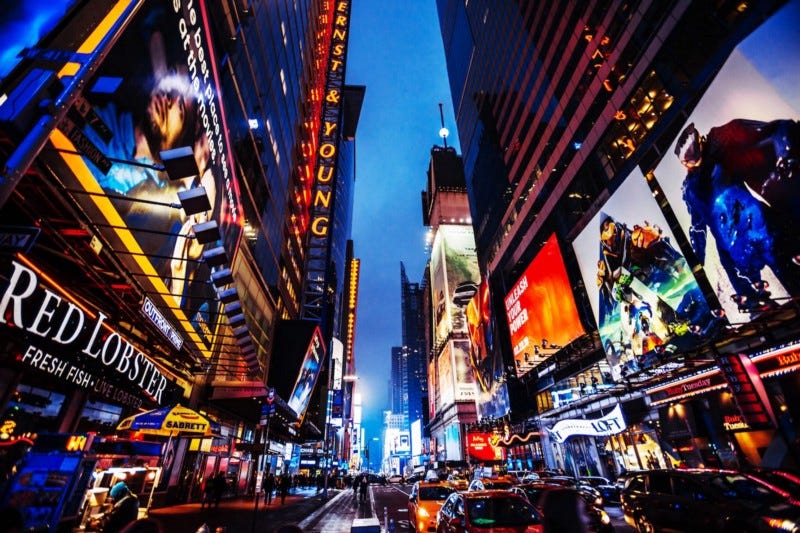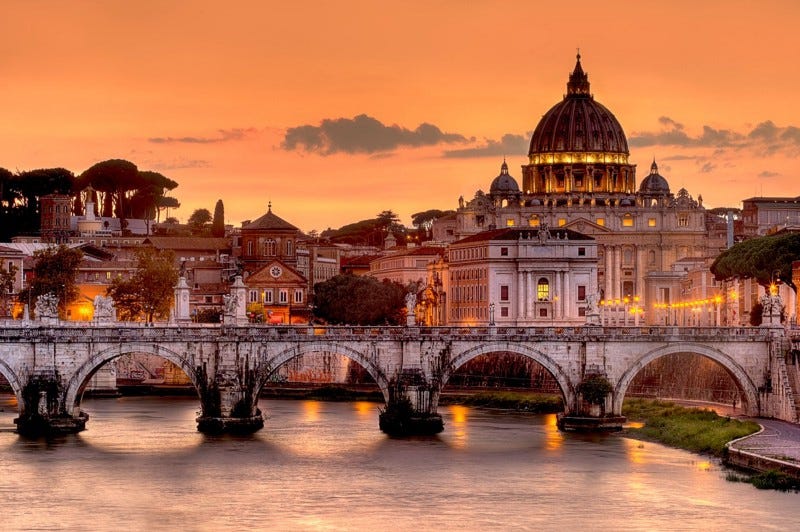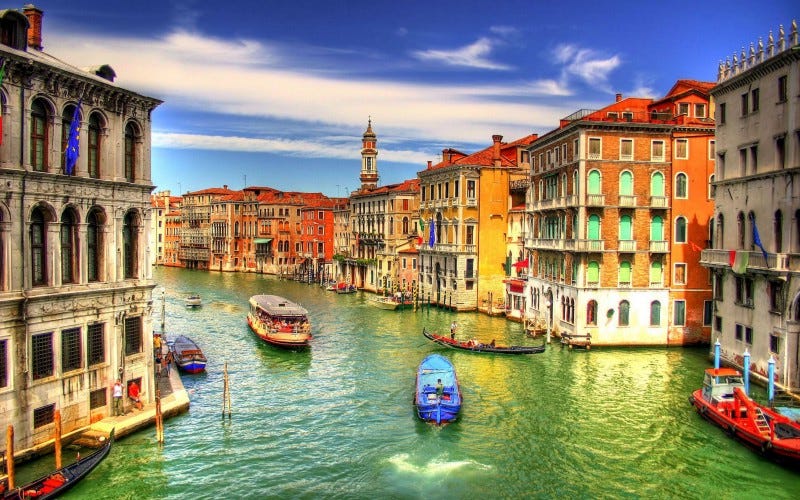I live in a rural piece of the UK, but I just got back from a work trip to North America.
Talk about culture shock.
Driving through the US and Canada reminds me of the strip in Las Vegas.
So much light, noise, color, and signage.
I can’t remember the last time I saw a billboard in the UK. And I’ve never seen one of those obnoxious 100-foot high restaurant signs off the highway. (They’re probably illegal.)
About a decade ago, my wife and I traveled through Central America and randomly discovered a ridiculously gorgeous town in Mexico called Patzcuaro. We couldn’t put our finger on why it was so beautiful until a local pointed it out:
“We don’t allow advertising.”
We looked around the main town square with new eyes. That was it. There wasn’t a single sign in sight.
Instead, each storefront was permitted a tiny space over its door to hand-paint the name of its business, all in the same font and color:
Even the mega-chain Subway sandwich shop had to conform to type.
Not only did it unify the town’s color scheme — and ensure every shop had a fair shot at earning your business — but it made sure no commercial enterprise distracted your attention from the real gems of the city: trees and fountains and the central square where teenagers and old people danced by moonlight.
It was the most enchanting town we’ve ever visited.
And it recently got me thinking:
Do we really need advertising?
Because we’re all so conservative and hate change and love the status quo, our initial reaction is to get defensive and say, “Of course we do,” but I’d like us to set aside our bullheaded stubbornness for a few minutes and think it through.
Everything has its costs and benefits. Is advertising worth the cost?
Let’s daydream for a minute and find out…
Advertising is bad for the planet
Advertising, by its very nature, encourages consumerism.
Case in point: I don’t watch basketball all year.
Then I devour two weeks of college ball during March Madness.
And do you know what?
For those two weeks only, I absolutely crave Dr Pepper, Sonic, Pizza Hut, and All State car insurance.
Because that’s the entire point of advertising.
Every business has five pillars: brand, channel, production, technology, and demand creation. Advertising is demand creation.
In 1980, the average person bought twelve new pieces of clothing each year, which is way too much. But now — thanks to fast fashion and and endless stream of advertising that teaches us we “need” to change up our wardrobe faster than Leonardo DiCaprio changes up supermodel girlfriends, the average consumer now buys an abhorrent 68 pieces of clothing per year.
Remember, there are years where I don’t purchase a single thing — meaning some teenage girl (statistically speaking) consumed 136 items of mostly slave-made clothing.
And all this consumption — of new clothing, new cell phones, new plastic bottles, new cars — is horrible for the planet from start to finish. If we banned all advertising, the average person would consume significantly less, simply because they wouldn’t even know that they “needed” Wolverine-style meat-shredding claws.
Advertising creates inefficiency
One of the major problems with capitalism is that corporations produce what’s most profitable, not what’s most needed.
That’s why builders build luxury penthouses for billionaires instead of affordable housing for our 500,000 houseless brothers and sisters in America.
That’s why chefs create million-dollar menus including gold dust lobster cheeseburgers instead of affordable meals to keep 9 million people from starving to death every year.
Advertising encourages a desire for luxuries.
When was the last time you saw a commercial for the cheapest rice or beans available in a 50-pound bag at bulk commodity prices?
Yet is it even possible to avoid trillion-dollar Apple and its incessant phone commercials? There literally isn’t a single person on the planet that genuinely needs an iPhone, and yet Apple spends billions per year convincing the masses to buy an unneeded luxury.
People are literally starving to death, but corporations are too busy making $8,000 Louis Vuitton bags instead of growing enough organic food to feed hundreds of millions of hungry kids.
Advertising isn’t necessary — and it’s a MASSIVE waste of time
Needs don’t require advertising.
Really think about that for a second.
People automatically seek out needs.
If you’re legitimately hungry, or desperately thirsty, or are freezing cold, or getting soaked by the rain, you don’t need an ad to tell you to seek food, water, clothing, and shelter. You just do it.
You don’t need ads to survive and thrive as a human being.
Yet how many ads will the average person see in their lifetime?
Between surfing the web, search ads, push notifications, newsletters, Facebook ads, Youtube commercials, TV, radio/satellite/podcasts, billboards, stickers on the metro, every store we pass, and all the free advertising people wear in the form of brand clothing, the average person is bombarded by literally thousands upon thousands of ads per day.
Let’s be super generous and say all those ads take just two seconds of our time each. 2000+ ads/day x 2 seconds/ad x 365 days/year = 405+ hours.
Multiply that by several hundred million Americans over the age of fifteen.
That’s 81 billion hours. It could easily be double or triple.
Every year, corporations are hijacking 9.2+ million years of human life without permission, all to sell us crap we don’t need. This is a world-scale crime against humanity, and it’s completely unnecessary.
Advertising wastes money
Who pays for all this advertising?
Certainly not McDonald’s or Budweiser or Chick-Fil-A.
You pay for all this advertising.
It’s the consumer who pays for all advertising, as part of their overpriced bill.
Coca-Cola alone spent $4,100,000,000.00 on marketing last year.
That means Coke drinkers worked for, and then wasted, $4.1 billion after-tax dollars… just to waste time watching Coke commercials.
Everything — literally everything you own — is more expensive because of ads.
Collectively, the global marketing industry is a $1.7 trillion annual business.
If we banned all advertising, we’d have enough after-tax money to send every single person under the age of 18 to university in most EU countries.
If we banned all advertising, we’d have enough after-tax money to buy all 500,000 homeless Americans a $3.4 million mansion.
If we banned all advertising, we’d have enough after-tax money to feed every hungry person in the world six times over.
Instead, we pay more for our stuff so they can convince us we need more stuff.
We should just cut out the middle man and pass the savings on to the people.
Advertising makes people waste money
Marketing executives are terrifying.
They’re almost as bad as Pixar.
Meaning: They prey on human emotions — love, fear, boredom, the desire for sex and power and prestige — and hijack our lizard brains.
Marketers hire psychologists, run consumer testing, and employ AI algorithms to manipulate the human psyche and there isn’t a person on earth who can best these extraction machines.
That’s why unnecessary consumer spending accounts for 70% of the entire U.S. economy.
That’s why Americans will burn $5.35 trillion per year by 2025, and why American households are $16 trillion in debt. (It’s even worse in shopaholic Canada.)
Advertising advantages monopolies
Little companies like my local dirt-to-plate organic farm shop don’t have the marketing budgets to compete with mega-monopolies like Kroger.
Even if a startup has a significantly better product, that’s longer-lasting, or has more features, or is more affordable, or has better customer service, they will literally never be able to compete at scale with trillion-dollar corporations who spend billions every year on marketing.
Advertising discourages word-of-mouth about genuinely great products, because it sucks all the air out of the room. By dominating the attention of the masses, corporations distract us away from real quality.
A perfect example: Former President Donald Tr*mp. That man earned trillions of dollars worth of publicity during his tenure, so much so that he dominated the news cycle and book publishers actually cut back on ad spending because they simply couldn’t break through the noise.
It’s particularly bad with the music industry, where record labels will drop millions on radio to break a Tayler Swift song onto the charts, while far more accomplished artists languish in obscurity because they don’t have the ad spend to monopolize the airwaves.
If we want to move towards a more relational economy, where humans interact with each other far more, we should ban all advertising. If we did so, the only advertising would be word-of-mouth, and the genuinely great products would naturally rise to the top and go viral.
Advertising is anti-meritocratic
This is connected to the previous point — You might have an inferior product, poorer service, or be more expensive, but if you can outspend on marketing, you win.
This is anti-meritocratic.
(And now that politics is a purchasable industry, it’s anti-democratic, too.)
We need the best things to survive, and everything else to die.
A perfect example of this is the movie industry. Marvel spends hundreds of millions of dollars per film to bombard TV and cinemas with their vapid trash, while legitimately great movies get buried at the box office because Marvel is pitching whatever inane eyeball extravaganza is up next.
Advertising turns people into products
This one is particularly scary online.
War criminal corporations like Facebook and Robinhood offer their services to users for free because their users are the products.
All these free sites track you, spy on you, invade your privacy, and then sell your data to… you guessed it… advertisers.
You don’t really get a sense of how insidious advertising is until you move to the countryside and start using private browsers in tandem with hardcore ad-blockers and privacy screens. Since I made the switch three years ago, my various and sundry systems have blocked more than 7 million ads… over 6,000 per day. (Honestly, what is wrong with people? How can anyone love money so much?)
But most people don’t live away from commerce-obsessed cities and haven’t bothered to protect themselves online.
Advertising is causing a global privacy nightmare.
Advertising keeps hate-fomenting companies like FOX and Facebook alive
Fox News would be bankrupt without ads for erection pills and heart medication.
Facebook would be bankrupt without all the get-rich-quick ads and the Russian election interference spends.
If we ban all advertising, we’ll quickly starve these anti-human corporations of oxygen.
That’s what makes Medium so great — users pay for unlimited high-quality articles with zero ads. No time wasted. No money wasted. And the users decide if Medium lives or dies.
Advertising makes the world ugly
Fish don’t know they swim in water.
Americans and Canadians don’t realize how hideous their cities appear to Europeans.
Let’s play a quick game so you see what I mean:
Here’s a picture of Athens:
Here’s a picture of Paris:
Here’s a picture of Rome:
Here’s a picture of Venice:
Here’s a random neighborhood in the Cotswolds:
Notice anything?
Zero billboards. Zero ads. Zero signage.
I don’t need to show you a picture of any American or Canadian city because you already know how ugly they are.
Europe just doesn’t really have billboards or signage like North America does.
And America is far uglier for it.
This drastically decreases quality of life for inhabitants.
For what?
So corporations can waste our time and money.
In conclusion
Humanity would be far better off without advertising.
Advertising is bad for the planet, it creates gross inefficiency, it isn’t necessary, it’s a massive waste of time, it’s a huge waste of resources, it makes people waste money, it advantages monopolies, it’s anti-meritocratic, it turns people into products, it foments hate, and it makes the world ugly.
We just don’t need it.
I won’t spend a cent to advertise this article, but if you think it’s worth something, please clap it up and share it with your friends.
Jared A. Brock is an award-winning biographer, PBS documentarian, and the cell-free founder of the popular futurist blog Surviving Tomorrow, where he provides thoughtful people with contrarian perspectives on the corporatist anti-culture. His writing has appeared in Esquire, The Guardian, Smithsonian, USA Today, and TIME Magazine, and he has traveled to more than forty countries including North Korea. Join 20,000+ people who follow him on Medium, Twitter, and Substack.










